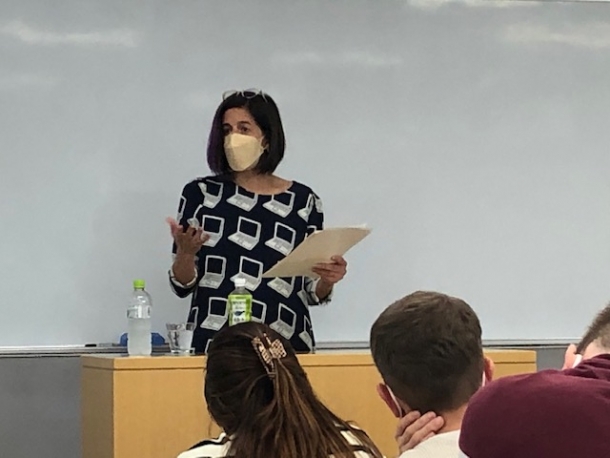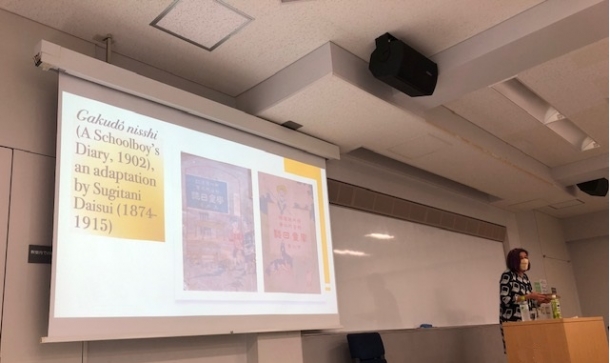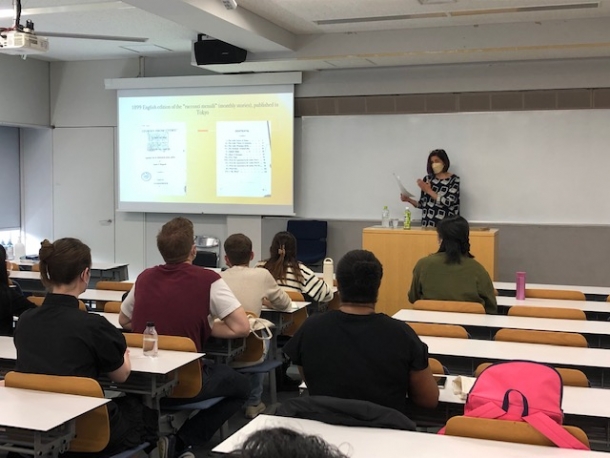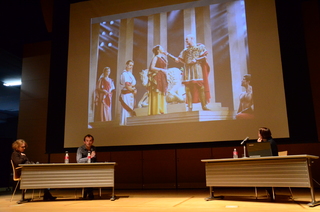This lecture was conducted in person at Waseda University’s Toyama Campus. The event saw 14 attendees, including attendance by undergraduate and graduate students, and members of the general public.
Dr. Ortabasi started by introducing Edmundo de Amici’s novel Cuore (Heart, 1886). While the book is not widely read today, one of the short stories included within it is known world-wide: “Dagli Appennini alle Ande” (“From the Appennines to the Andes”). That is mostly thanks to the animated show 3000 Leagues in Search of Mother (『母をたずねて三千里』, Haha o Tazunete Sanzenri), produced by Nihon Animation in 1976, and famous around the globe by the name of its protagonist, Marco.

Dr. Ortabasi explained that Cuore was mostly used in Meiji-era Japan as an English-learning text, and was widely read in the 1887 translation by Isabel Florence Hapgood. Since the novel deals with the everyday experiences of children, and contains twelve independent short stories, it was considered a perfect material for foreign language instruction. The most popular of these short stories was “From the Appennines to the Andes,” of which there were many translations published as independent volumes at the time. According to Dr. Ortabasi, a reason for the story’s popularity may have been the fact that it is the only one in the collection that includes a happy ending that involves the fulfillment of the child protagonist’s dream of reuniting with his mother.

Dr. Ortabasi moved then to discussing the first Japanese translation of the work, published in 1902 by Sugitani Torazо̄, a disciple of Tsubouchi Shōyō’s. The translation, written in the new colloquial style, emphasized the themes of national consciousness and personal growth, both themes dear to the Meiji era. The short stories included in the volume were rethemed to Japanese-related locales. For instance, the tale “La piccola vedetta lombarda” (“The Little Lombard Scout”) is told as the story of a Korean boy who helps the Japanese army during the First Sino-Japanese War (1894-95). At the same time, Sugitani’s translation did not ignore the theme of emotional development, the “education of the heart,” and thus is an important piece in the history of modern Japanese literature.
After the lecture, there was a 20-minute period of Q&A that produced an animated discussion on the topics of Cuore’s position in the history of literature in translation in Japan, and its possible influence on later works of children’s literature written in Japanese. Dr. Ortabasi stayed afterwards to talk individually to several of the attendees.
Event Overview
- Date and time: May 27, 2022, 16:30 – 18:00 (JST)
- Language: English
- Lecturer: Dr. Melek Ortabasi (Simon Fraser University)
- Venue: Room 681, Building 36, Toyama Campus, Waseda University.
- Participation is free.








